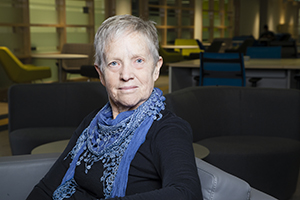
Feminist legal scholar and Queen’s Law professor Bev Baines was presenting her paper, “
Women Judges on Constitutional Courts: Why not nine women?” while attending a plenary panel discussion at the ICON-S conference recently when she raised the question of why feminist perspectives were not considered more often in court decisions.
The panel consisted of Supreme Court of Canada Chief Justice Beverley McLachlin, Justice Marta Cartabia of the Constitutional Court of Italy and Judge András Sajó of the European Court of Human Rights at the International Society of Public Law conference in Copenhagen earlier this month. During this panel, the judges discussed how they look to judgments from other courts when making their decisions. The discussion prompted Baines to ask them: What about looking at judgments from feminist perspectives?
The Feminist Judgments Project is a global initiative that began in Canada in 2004, where lawyers, scholars and activists rewrite court decisions using feminist perspectives.
“The argument is that only by rewriting existing judicial decisions from a feminist perspective could feminist scholars and lawyers and activists and some judges show that the original decisions were gendered male,” says Baines, an avid supporter of the project. “If they could be rewritten using feminist legal reasoning, perhaps they could come to a different conclusion using this different reasoning.”
The
original FJP rewrites in Canada were released in 2006: six cases appearing in the Canadian Journal of Women and the Law, Volume 18, Number 1. These were rewritten using the elements from the Canadian Charter of Rights and Freedoms’ s. 15 — equality rights.
“An attempt was made where scholars and lawyers and activists wrote deliberately from a feminist perspective. Could they do it? If they did it, would they show the original decisions were gendered? Would their work come through and illuminate that?” says Baines.
Other countries caught wind of Canada’s FJP rewrites in the journal, prompting them to publish books with the same concept using cases from their own nations.
The U.K. rewrote 26 judgments in 2010; Australia rewrote 25 judgments in 2014; and in 2016, the U.S. rewrote 25 constitutional decisions. Most recently, in February, Northern Ireland and Ireland together published their version of the FJP — 27 cases. There are also offshoots in the forms of individual papers, such as Jennifer Koshan’s rewrite of the
R. v. J.A. case.
Baines says that she is fascinated by the expansion of the project following suit with what Canadian scholars put out in the journal.
“Feminist Judgments Project is a Canadian creation that has spanned the world over the next decade after the Canadians began it. It shows that there’s a real need out there for feminists to rewrite the judgments of existing courts, not all of them Supreme Courts, but most are,” she says.
Aside from using the FJP for a fresh perspective and detection of gender bias, Baines says these rewrites could be used in educating the lawyers of tomorrow.
One of Baines’ students at Queens University’s Faculty of Law applied the legal reasoning of Koshan’s rewrite to rewriting their own feminist judgment of the polygamy reference rendered in B.C. in 2011.
“This shows that students are keen and interested in the writing of feminist judgments,” she says. “By learning this, they’ll become lawyers who understand this kind of legal reasoning.”
But students are not the only group that could benefit from learning about applying feminist legal reasons to judgments. According to Baines, McLachlin said that, “If you want our courts to take [the feminist legal reasoning] into account, lawyers have to argue them.” She added that the chief justice’s words seem to point to what the next step is in the value of the FJP rewrites.
“Judges often make decisions from their own values and many of those values are not feminist,” says Baines.

 Feminist legal scholar and Queen’s Law professor Bev Baines was presenting her paper, “Women Judges on Constitutional Courts: Why not nine women?” while attending a plenary panel discussion at the ICON-S conference recently when she raised the question of why feminist perspectives were not considered more often in court decisions.
Feminist legal scholar and Queen’s Law professor Bev Baines was presenting her paper, “Women Judges on Constitutional Courts: Why not nine women?” while attending a plenary panel discussion at the ICON-S conference recently when she raised the question of why feminist perspectives were not considered more often in court decisions.